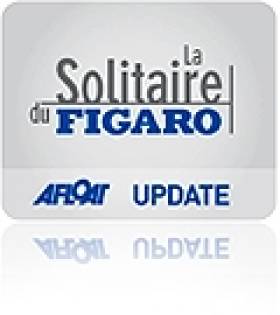Displaying items by tag: Caen
Preparing for the Challenge of La Solitaire du Figaro
Dubliner Paul O'Riain's comprehensive article on his Figaro debut experience in 2007 has moved, Click this link for it and the latest La Solitaire du Figaro news.
La Solitaire du Figaro's Dun Laoghaire Stop-Over
Details for next year's course of the La Solitaire du Figaro race were revealed at the Paris Boat Show yesterday. The race will comprise four French towns and Dun Laoghaire will be the only foreign port of call when the boats are expected to arrive on 10 August.
In spite of Dublin airport weather delays a National YC contingent headed by Commodore Peter Ryan made it to Paris in time for the announcement.
Following several days for rest, the fleet shall once again set sail on 7 August for the second leg, of 470 nautical miles, that will take the Figaro Bénéteau 2 towards Dún Laoghaire. After leaving the Bay of Seine, a 40-mile or so run, the first obstacle will be the passage of the Barfleur point. The course remains inshore, as the single-handed sailors will sail along the Cotentin to the cape of the Hague, before heading towards the Channel Islands.
It will be compulsory to leave the islands of Aurigny, Herm and Guernsey to starboard. The skippers will then take on a long crossing of the English Channel, 120 nautical miles to Land's End. The last third of the course is a sail up almost full north over 190 nautical miles to reach Dún Laoghaire.
The Dublin Bay harbour is set to be a discovery for the visiting sailors and where the National Yacht Club are to be the host venue. After a few days rest and recuperation, the fleet then will set sail on 14 August to The Vendée and Les Sables d'Olonne. This third leg is long at 475 nautical miles with boats expected on 17 August.
Four days later and the final leg departs on 21 August with the boats setting a course for Dieppe, to arrive on 24 August. On the following day the Normandy port will also be hosting a closing regatta. For more information www.lasolitaire.com
Preparing for La Solitaire du Figaro here
Latest news for La Solitaire du Figaro here























































